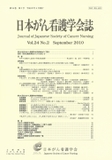Japanese
English
- 販売していません
- Abstract 文献概要
- 参考文献 Reference
- サイト内被引用 Cited by
要旨
目的:術後1年以内までの前立腺がん患者の排尿機能障害および性機能障害の対処行動とQOLとの関連を明らかにすることである.
方法:前立腺全摘除術後患者76名(平均年齢65.9歳)を対象とし,自己記入式質問紙調査を実施した.
結果:対象者の78.9%が排尿機能障害を,90.8%が性機能障害を,69.7%が排尿機能障害と性機能障害の両方を認知していた.対処行動である「問題への取り組み」とQOLの下位尺度である家族社会面(rs=.44,p<.01),機能面(rs=.35,p<.01),「外的資源の活用」と家族社会面(rs=.26,p<.05),心理面(rs=.25,p<.05),「積極的気分転換」と家族社会面(rs=.34,p<.01),機能面(rs=.25,p<.05)とには有意な正の相関がみられた.また,「問題への取り組み」と身体面(rs=−.29,p<.01),「自己統制」と身体面(rs=−.31,p<.01),「陰性感情発散」と機能面(rs=−.40,p<.01)には有意な負の相関がみられた.
結論:術後機能障害を認知している前立腺全摘除術後患者の対処行動とQOLとの関連からは,術後機能障害に直面している患者のQOL向上に向けて,その対処行動を高める支援の必要性が示唆された.具体的には問題解決に向けて社会におけるさまざまな人達との交流を営んでいく能力を高める支援,外部から得られるさまざまな解決方法を患者自身が選択し活用していく能力を高める支援,術後機能障害に影響する合併症を管理し気分転換を促す支援である.
Abstract
Objective: To clarify the relationship between QOL and coping behaviors for prostatic cancer patients' voiding and sexual dysfunction during their first postoperative year.
Methods: Subjects were a convenience sample 76 men who underwent total prostatectomy. Data was generated from self-administered questionnaires.
Results: Among the subjects(mean age: 65.9 years), 78.9% had voiding dysfunction, 90.8% had sexual dysfunction and 69.7% had both voiding and sexual dysfunction. Significant positive correlations were observed between:(1)"addressing problems"(coping behavior)and two QOL subscales [(family social aspect(rs=0.44, p<0.01)and functional aspect(rs=0.35, p<0.01)]; (2)"use of external resources" and family social aspect(rs=0.26, p<0.05)and psychological aspect(rs=0.25, p<0.05)and(3)"active change of pace" and family social aspect(rs=0.34, p<0.01)and functional aspect(rs=0.25, p<0.05). Furthermore, significant inverse correlations were observed between: "addressing problems" and physical aspect(rs=-0.29, p<0.01); "self control" and physical aspect(rs=-0.31, p<0.01)and "manifest negative feelings" and functional aspect(rs=-0.40, p<0.01).
Conclusions: The relationship between QOL and coping behaviors in patients who underwent total prostatectomy and experienced postoperative dysfunction suggests the necessity of providing support for strengthening the coping behaviors of patients facing postoperative dysfunction in order to improve their QOL. More explicitly, it is important to provide support for the following: improving skills for interacting with various types of people in order to solve problems; improving skills for selecting various solutions that are available externally and encouraging a change of pace and managing complications that impact postoperative dysfunction.
Copyright © 2010, Japanese Society of Cancer Nursing All rights reserved.


